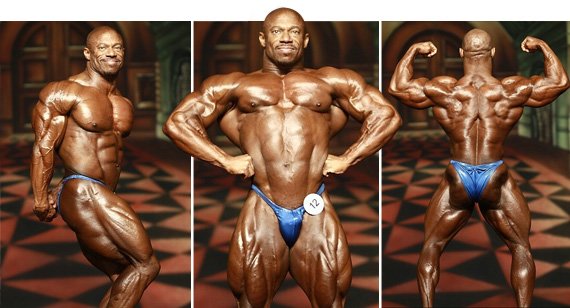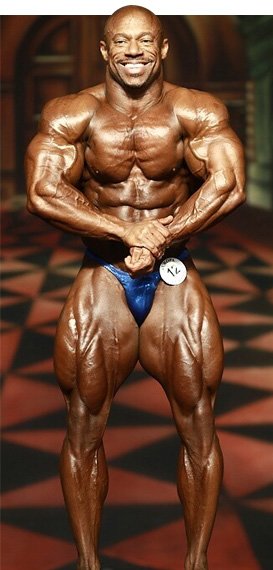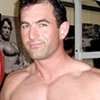They may call him Tricky, but when it comes to bringing his A-Game, pro bodybuilding's 202-pound great Richard Jackson isn't playing around. He makes no attempts to hide his stunning muscularity onstage; and as one of the IFBB's best posers, he makes sure the judges can see it from all angles. Although he's not the largest competitor in his division, Tricky is one of the classiest, entertaining and complete, symmetrical athletes.
He might be approaching his fifth living decade, but his recent 2nd-place finishes at the IFBB Dallas Europa Supershow and Muscle Heat events, demonstrate that he's better than ever. He proves with each passing show that age is just a number and is of lesser importance than the cumulative experience of many years competing.
Tricky placed 11th in his first 202 Showdown event, but in recent years has continually cracked the top-10. This year, the veteran expects to make it inside the coveted top-6. He has his work cut out for him. He's about to compete in a lineup that's more stacked than ever; but his determination to bring his best shape, conditioning and size to the stage makes him one of the toughest to beat.
Check out how he's prepared for the 2012 Olympia:
Supershow you
looked to be bigger and better than ever. Would you consider this showing to be among your best ever?
Actually, I thought I was a lot better a week after at the North Carolina show. I think I was fuller in Dallas than I have been in the last few outings, but my conditioning wasn't 100 percent. The extra week of dieting going into the Greensborough allowed me to dial it in and get my conditioning close to perfection.
Absolutely. I still think I can be about two percent fuller; and with the last days of prep, I can be a little drier.
Given the amount of time I have been in the weight-training game, I'm probably not going to make many drastic changes. I think the best thing I can do is just tweak the diet over the last couple of weeks to gradually creep up on better conditioning. I have probably been pretty close to my best. Fortunately for me, when I'm at my best I'm competitive with the top 6-or-7 best guys in the world. For me, preparation is more about not losing that edge as opposed to making great mass improvements. I want to still be competitive, as often as I can, with what I have.
Yes. I think it is true that as you get older, you train smarter, not harder. There are times when I feel really good in the gym and can really push the intensity and go heavier; but those days a little more few and far and between than they used to be. I can't go balls-to-the-wall each time, but when I do I take advantage of it. When my body is sore and achy though, I'm smart enough to hold back so I don't injure myself. As you get older, you become more injury prone. I think because I listen to my body, I've been able to continue in this sport.
I want to focus on really saturating the muscle with blood. That's not necessarily done by just pushing heavier weights each time. I will do dropsets, use moderate weights and do forced reps. Different techniques like that, as opposed to just going heavier, have helped me to maintain my mass.
Yes, definitely. I think when you have been in the trenches as long as I have and have acquired the size slowly over 25 years, you have a solid base. People are kind of astonished with my leg development, but those body parts were really pounded over the first 10 years of my career. For the past ten years, because of back injuries and other issues, I haven't trained nearly as heavily as I used to on deep squats and some leg press movements. My emphasis on saturating the muscle with blood has been enough to maintain the development I acquired in the first half of my career.

That's probably been the biggest challenge. Since I turned pro I have grown and have had to make caloric adjustments to compensate for the added muscle. That was one of the first things I learned as a middleweight. I gradually put on size; 4-to-5 pounds of size here and there bumped me up to light heavyweight. But I would diet down and lose muscle right away because my caloric intake was not adjusted. Once I began making adjustments, I was able to maintain my hard-earned muscle.
My biggest challenge as I've aged is kick-starting my metabolism once competition time rolls around. Metabolism slows down with age, so I have to eat leaner foods like fish sooner in my diet phase. Cardio is also more crucial now.
My master's show this past December [Tricky placed seventh in an event won by Dexter Jackson] actually forced me to have a shorter off-season because I competed so late in the year. Because I started competing earlier, I didn't add as much body fat as I have in past off-seasons. My metabolism is a little slower now, so it makes better sense to stay closer to competition weight than to put on a bunch of additional weight in the off-season in an effort to build more muscle. It's smarter to stay closer so it's easier to strike.
Well, the highest I've been in the Olympia is seventh place. I've been stuck in eighth place over the past two years. I have no dreams of winning the Olympia, though that would be a lovely thing. But to be able to even have a shot, I have to make the first callout for that top-6. That is my first goal: to make that top-6. Once I make that top-6, then I can be compared to the best in the world and possibly place as high as first. Toney Freeman said, "Give me the opportunity to stand next to the best, and I will show you what I have got." That's what I'm looking to do: show what I have.
I'll have to cross that bridge when I come to it. It's been a long journey. I can easily see myself continuing to make that top-6. If I did that, I would become motivated because then it would be realistic to say that I could go on to win this thing. If I make the top-6, I will go back and discuss the future with my sponsor and my family. But I need to get to that point first.
I definitely need to bring my best combination of conditioning and fullness. For the last couple of Olympias, I think my conditioning has been there, but I don't think I have been as full as some of the guys who have made that top group. There have been some close ones: times when I have scratched my head trying to figure out why I wasn't in that top-6. I think the guys on my team understand that I'm compared with the conditioning I've brought in the past. If I don't bring the right level of conditioning, the judges won't even look at me. So, my team has me focus on my conditioning. But, we always make sure that I maintain my fullness. For the past 4-to-5 shows, we've combined great conditioning with maintaining full muscle bellies. That gives you the 3D effect onstage which makes you look as big as the top guys. I think my conditioning is close to those guys' but when I have that fullness, I think you will see Tricky holding his own, size-wise, with these guys as well.
I agree. I can't understand it when a person says, "Well, Tricky, this guy edged you out because he is a little bit bigger than you." And we are talking about a guy that might be 10 pounds bigger than me. Look at Dexter Jackson in the open, who can beat guys 40 pounds bigger than him. So I don't feel that just because a guy is 10 pounds bigger, he should beat me. That makes no sense at all. As an athlete, I just try to bring the package the judges are looking for.

That's an easy one: the fans. I had some ups and down with my training partner this year and wasn't able to be consistent with my contest prep for the first show, so I started to lack a little motivation. I began to communicate with my fans on my Facebook page and with other athletes in the industry who are going up the ranks in the NPC and are hungry to get where I am. I've been feeding off of that energy and it's worked great for me for the past six months.
It's funny you should say that. I' m actually 45-years-old today. I feel like I'm at the top of my sport and only have a certain amount of time to maintain my status. I don't want to be like one of those guys who makes the decision to retire because his career is going backward. I'm at the point now where I coach basketball for my son's team and I follow my family around for football and martial arts. I'm starting to see that tug of war between what I have to do in the gym and my responsibilities to my family. Those are the things that will determine how long I compete. Right now, I'm thinking one more year, max. As far as staying healthy, I could probably still do it with the support of my family. If I'm able to juggle everything, I could probably do it for another 4-to-5 years. At the end of the year, I will assess and make a determination for the following year based on how the previous year went. I will take it a year at a time and make the best decision for my family and myself.
You are absolutely right. We all set goals in life and try to accomplish them. I have pretty much achieved all that a person can in this sport, other than winning the Olympia. This will be my fifth year in a row competing there and I have been in the top-10 the last 3-of-4 years. If I come in sixth, maybe I will be happy, but if I came in third or fourth then it's going to be more difficult to let it go.
It's a representation of being part of a sport and being among the best of the best in the world. It's where everybody wants to be; it's an accumulation of years of time and effort coming to a head. It's a privilege and an honor to be there, to be part of that elite group.
